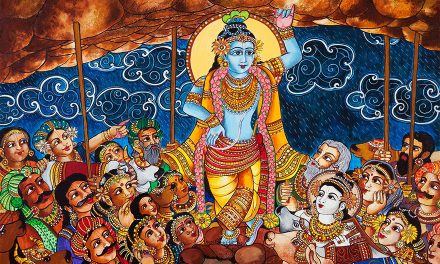trayo dharmaskandha yajno ‘dhyayanam danamiti prathamah
– Chandogya Upanishad
Religion has three bases. Out of these, yagya, study and charity are the first basis.
Yagya: A religious follower should adopt yagya in his life. All the works of charity and help come under yagya. Nowadays, it is used only for havan (sacrificial fire). However, yagya has a broad meaning. Acquiring knowledge of the five great elements (panch mahabhutas) created by God and taking help from them is yagya. As havan is beneficial only for the mankind, it purifies the environment, cures diseases and makes the atmosphere fragrant. The objectives worship of God, having the company of good people (satsang) and charitable deeds are fulfilled through yagya.
Study: The human should improve and update his knowledge continuously with the study of Vedic literature and mythological texts, describing the God. Reading good and holy books improves the intellect and removes ignorance and enlightens the soul with the knowledge of light.
Charity: A person should donate one-tenth of his income to destitute, helpless, sick, suffering, poor people, orphanages, Gurukul and other charitable places. The donation, which is given with selflessness at the right time, to the right person and at the right place is most superior.
Donating knowledge is superior to donating water, food, cow, land, clothes, sesame, gold and ghee. Devotion: Devotion is the second basis of religion. Facing the difficulties and tolerating them in fulfilling ones duties and responsibilities is called devotion. Tolerating fame-blame, happiness-unhappiness, gain-loss, cold-hot, hunger-thirst and other conditions and fulfilling our duties is called devotion. It has three forms – physical, mental and verbal. The secret of these three forms on the basis of satva-raj-tama (pure, passion-anger) are as follows:
Worshipping God, Brahmans, Gurus and learned men, leading a chaste, simple, celibate and non-violent life comes under devotion of the body. Polite speech, true along with politeness, beneficial, study of good books and practicing the study come under the devotion of speech. The physical, verbal and mental devotion are called satvic devotion. The physical, verbal and mental devotion performed with the objective of gaining name, fame, show, exhibition are called rajasic devotion. They do not last for long and are temporary. The physical, mental and verbal devotion, which is done with stupidity and meaninglessly by causing pain to oneself or for causing harm to others, are called tamasic devotion. The believer of religion should always tolerate the difficulties and indulge in auspicious deeds and try to overcome the difficulties with intelligence.
Third Basis
A celibate in the ashram of his Guru giving pain to self is the third basis of this religion. Celibacy is the foundation for the human life. The stronger and deeper this foundation, the stronger and stable the life. Saint Dayanand Saraswati said that celibacy is the basis of all other stages in life, improves other stages if it is carried on well and ruins other stages if it is not carried on properly.
acarya upanayamano brahmacarinam krinute garbhamantah
tam ratristisra udare bibharti tam jatam drishtum abhisamyanti devah
– Artharva Veda
This means, the birth of human being, which resides in the womb due to the relationship of mother and father is called the first birth. The second birth is one in which father is the teacher and mother is the knowledge. The absence of the second birth does not give humanity to a person. Therefore the people should acquire it. When a person goes to a teacher at the age of eight and lives in his proximity from that time onwards they become celibates (both male and female). Because they are engrossed in the thoughts of God and Brahma. The teacher keeps them in his womb for three nights, in other words worship of God, religion and the knack of learning and thinking and other important concepts are taught in these three days. After this learned men examine the students. A celibate controls his sensory organs and tolerates all sorts of difficulties in order to gain knowledge from his teacher. He develops his physical, intellectual and mental powers by leading a disciplined and austere life. He sacrifices the material comforts and leads a simple life, remains in the proximity of Gurus and acquires knowledge for all round development and becomes talented. A lazy, inactive and lover of comfortable and luxurious life can never acquire knowledge. A good celibate learns Vedas, establishes truth and religion in the world and works for the welfare of the mankind. Therefore acharyas consider celibate to be the third basis of religion.












